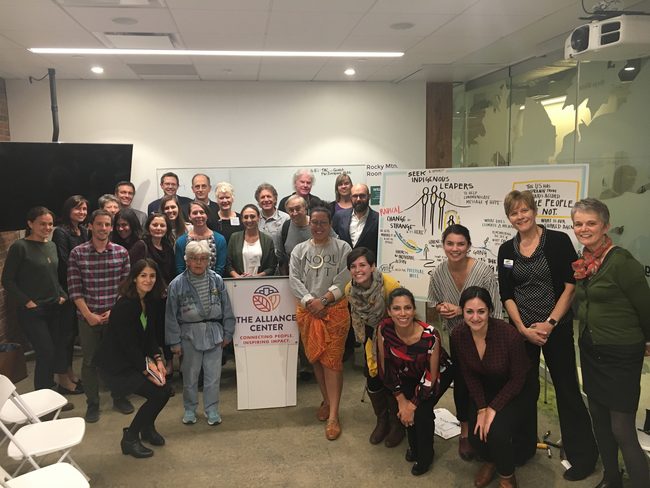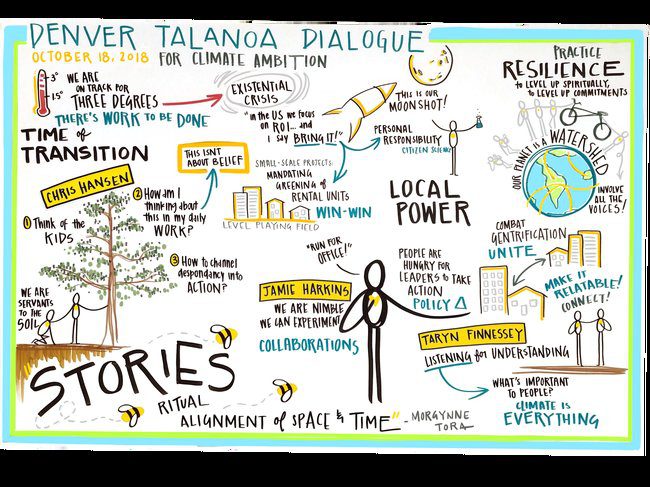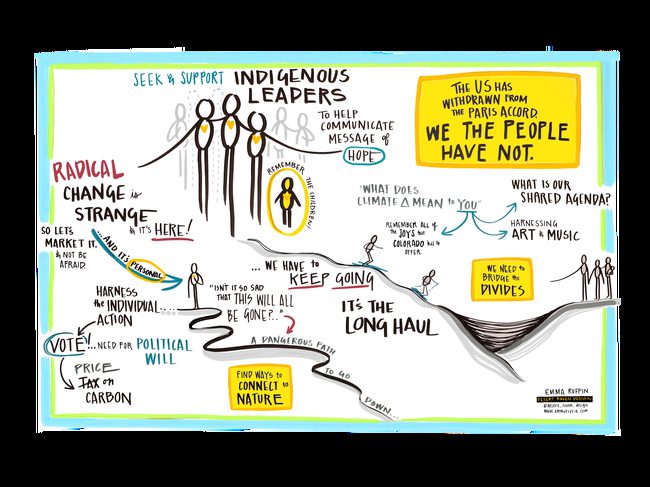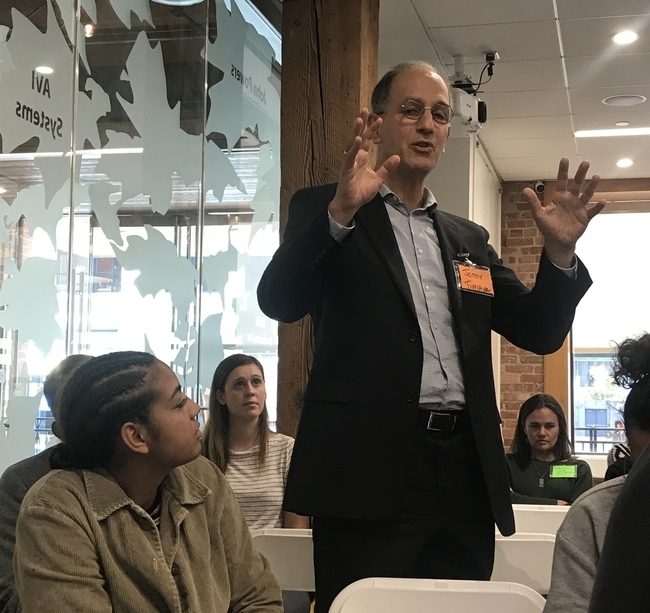
On October 18th, 2018, ICLEI-Local Governments for Sustainability USA and The Alliance Center hosted Talanoa Dialogues Denver, an historic event for international climate negotiation that brought together local elected officials, community leaders and engaged citizens from cities of Denver, Boulder, Lafayette, and other constituents from the Colorado Front Range region to discuss local support for the Paris Agreement and the future of regional climate action.
The Cities and Regions Talanoa Dialogues were introduced by the nation of Fiji during its Presidency to COP23, the United Nations’ 23rd annual climate change conference held in November 2017. Talanoa is a traditional word used in Fiji and across the Pacific to reflect a process of inclusive, participatory and transparent dialogue. The purpose of Talanoa is to share stories, build empathy and to make wise decisions for the collective good. Through these dialogues, national and local governments and their stakeholders have convened 60 events in more than 40 countries to drive forward multilevel climate action worldwide.
At Talanoa Dialogues Denver, participants addressed the three main questions at the heart of the Talanoa Dialogue:
Where are we?
Where do we want to go?
How do we get there?
By recording the answers to these questions as part of the official UN climate negotiations, the Cities and Regions Talanoa Dialogues process aims to “fix-and-lift” Nationally Determined Contributions (NDCs), the national-level commitments to the Paris Agreement, by bridging sustainable urban development with climate action and engaging all levels of governments. For the Denver event, this meant participants needed to bring an open and honest discussion on climate change, getting to the root of its impacts to the regional community and what leaders and stakeholders can do as individuals and as a collective Colorado community to uphold the ideals of the Paris Agreement in the face of inaction at the U.S. federal level.
Morgynne D’Sulueti Tora Performs Poetry at Talanoa Dialogue Denver ICLEI USA event 10.18.2018 from ICLEI USA on Vimeo.
Format of Talanoa Dialogues Denver
Sandra Halvatzis, Director of Program for The Alliance Center, welcomed participants. The opening honors were performed by Morgynne D’Sulueti Tora, a poet of Fijian heritage in Denver, who introduced participants to the the concept of Talanoa through poetry and traditional song. Emma Ruffin of Desert Raven Designs used a visual storytelling technique called graphic scribing to capture the discussion, allowing for an interpretation of the Dialogue’s words to take on an artistic yet quickly approachable visual format.
Angie Fyfe, Executive Director of ICLEI USA, provided overview of the first two Talanoa questions: where we are and where we want to go. State of Colorado House District 6 Representative Chris Hansen, State of Colorado Senior Climate Change Specialist Taryn Finnessey, and City of Lafayette Mayor Pro Tem Jamie Harkins shared their constituents’ climate stories with the group. The key to unlocking the Talanoa Dialogues’ power are having diverse, inclusive representation at the discussion table. To this end, the event brought state and local policymakers, business leaders, people who work in and outside of sustainability roles, as well as interested citizens who all came to the table to represent their unique voices in collective visioning.


Emma Ruffin of Desert Raven Designs used a visual storytelling technique called graphic scribing to capture the discussion. Ruffin’s depictions of the Talanoa Dialogues Denver are shared with permission.
The event’s primary discussion focused on answering Question 3: How do we get there? Because this Talanoa Dialogue took place just about one week after the release of the IPCC 1.5 report, and the immediacy and desire to act was unmistakable. As a roundtable commenced for participants to share their climate stories, discussions turned to what actions we can take as individuals — as residents of Denver, the Front Range, and Colorado State. Highlights include:
- Building resiliency through alternative venues, for example, incorporating the arts into emergency preparedness.
- Building coalitions to strengthen collective voices, and especially working with indigenous leaders.
- Strengthening the ways we talk about climate change, and finding the most effective messaging and communications channels.
- Voting with our voices and with our dollars, and electing representatives who are not afraid to fight for the environment.
“We need to—and can—elect leaders who are courageous enough to make climate change a central platform.”
—Mayor Pro Tem Jamie Harkins, Lafayette, CO
City of Denver Chief Sustainability Officer and ICLEI Global Executive Committee Portfolio Chair Jerry Tinianow addresses how city-scale climate action relates to global processes during the Talanoa Dialogues Denver event.
Where Do We Go from Here?
After the Talanoa Dialogue the notes, highlights, and photos were compiled into a synthesis report sent to ICLEI World Secretariat for inclusion in a final outcomes report to the United Nations Framework Convention on Climate Change (UNFCCC). Together with the reports from the more than 60 other Talanoa Dialogues hosted around the world, this will feed into climate negotiations at the 24th United Nations Conference of the Parties (COP24) held in Katowice, Poland, in December 2018. COP 24 will represent the culmination of the yearlong Talanoa Dialogues process during which participants took stock of collective efforts on progress towards achieving the long-term goal of the Paris Agreement, with the aim of informing the political phase and the preparation of Nationally Determined Contributions. The stories, lessons, and ideas coming out of Denver will be used to represent the opportunities and challenges that face Denver, the Front Range, and beyond.
On December 6, the Talanoa Dialogues will conclude its preparatory phase, which will “include a space to consider” the implications of the Intergovernmental Panel on Climate Change (IPCC) Special Report on Global Warming of 1.5°C (SR15). In advance of this wrap-up meeting, Fiji as the COP 23 President and Poland as the COP 24 President will issue a document that synthesizes the information and insights gained over the past year to provide a foundation for the political phase of the Talanoa process, which will close on December 12. A summary of key messages from the ministerial roundtables and closing statements will be provided afterward.
Key Takeaway: Cities and Counties Must Raise Ambition and Take the Lead on Climate
Talanoa Dialogues Denver, as part of the broader Cities and Regions Talanoa Dialogues, played an effective role for a reality check to the U.S.’s relative abandonment of the national NDC and served as a means to downscale and localize the global discussions on the Paris Agreement.
So much more will be needed from cities, towns, counties and regions to ensure the warning from the IPCC’s latest 1.5-degree report are not made a reality. Cities as conveners of knowledge, technology, economic development, human capital and leadership are expected to take the lead in the efforts towards mid-century carbon neutrality — a vision laid out in the ICLEI Montreal Commitment released ICLEI World Congress 2018.
ICLEI members, in particular, have the ability to approach local actors, involve them in the process, and put them in the driver’s seat. This is why the Portuguese national government is currently working on actions to enable cities to be the trigger of local collaborative processes. ICLEI USA and its hundreds of member cities, counties and affiliates will spend the coming year focusing the outcomes of the Talanoa process into concrete climate action at the city, region and national level.
Follow the Talanoa Dialogues process into COP24 and beyond at Cities-and-Regions.org. To bring the spirit of Talanoa to your city, contact us at iclei-usa@iclei.org.
